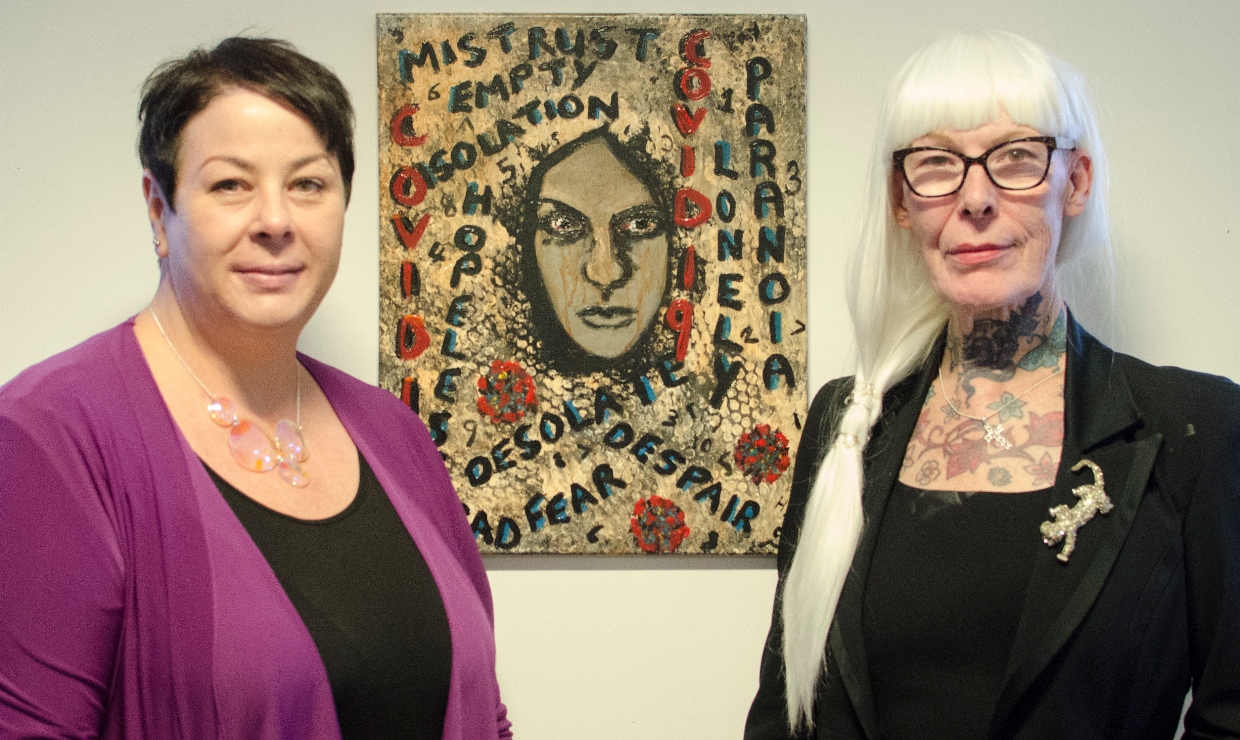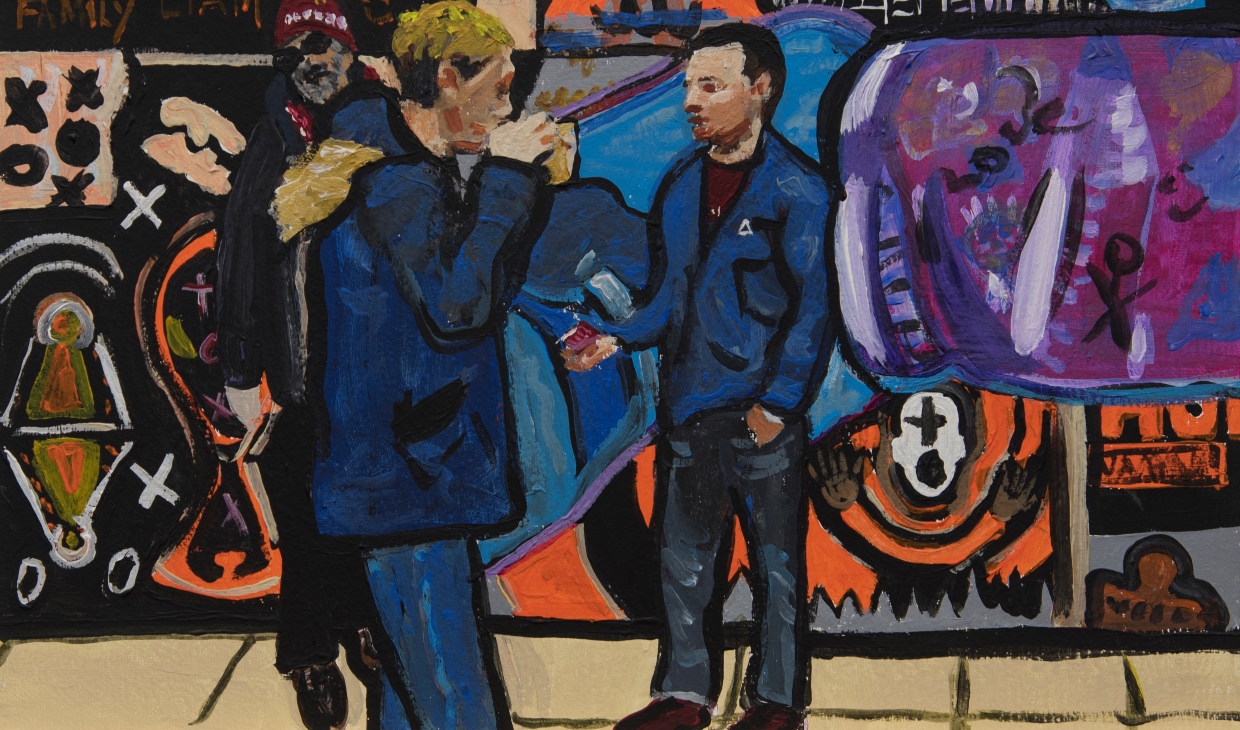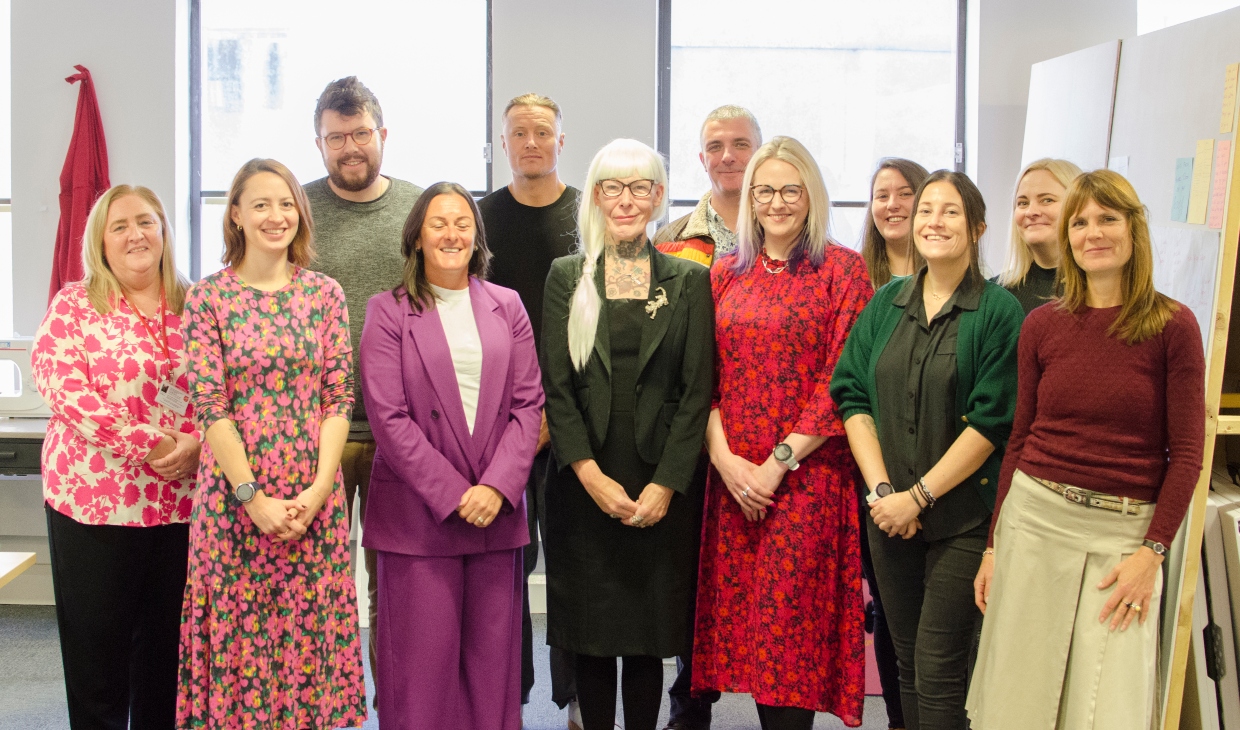Art chronicles alcohol and homelessness study as researchers seek innovative way to share findings
A unique art event took place this week in Glasgow chronicling the findings of a research study into the effects of managed alcohol programmes during the COVID-19 pandemic.
/filters:format(webp)/filters:no_upscale()/prod01/cdn/media/stirling/news/1920X689-banner-image-MAP-art-event.jpg)
A unique art event took place this week in Glasgow chronicling the findings of a research study into the effects of managed alcohol programmes during the COVID-19 pandemic.
Elena Whitham, Scottish Government Minister for Drugs and Alcohol Policy, attended the event at The Articulate Cultural Trust and Hub in Glasgow along with artist Linda McGowan and academics from the University of Stirling.
The study’s authors, Professor Tessa Parkes and Dr Hannah Carver, asked Linda McGowan, along with Articulate Gallery Manager Stuart Duffy, to showcase the research findings through paintings.
The paintings depict key issues affecting the lives of people experiencing alcohol dependence and homelessness. In the study, Professor Parkes and Dr Carver looked at managed alcohol programmes (MAPs), where alcohol is provided in regular and measured doses alongside other support, and how it could reduce risks faced by service users during the COVID-19 pandemic.
While the findings were published last year, with the artwork included in the research paper, this is the first time the paintings have been exhibited. Service users and staff who were involved in the study, conducted in partnership with The Salvation Army along with people from homeless charity Simon Community Scotland, were invited to attend the event.
Linda used the findings and what she learned attending the research meetings to create eight paintings, each depicting the lives of people who might benefit from MAPs in Scotland - from their friendships to the isolation and stress brought about by the pandemic.

Elena Whitham, Scottish Government Minister for Drugs and Alcohol Policy (L) with artist Linda McGowan at the event.
MAPs are a harm reduction intervention for those experiencing homelessness and alcohol use disorders. Usually residential, their service users buy their own alcohol and staff provide it to them on a regular basis and in a monitored way. The Glasgow facility is the only one operating in Scotland.
Dr Carver said: “We wanted to do something a little different with this project. As academics we are used to presenting at conferences and writing papers, but it is important to capture our research findings visually, given the emotional context of the work. We wanted to bring our findings to life for a range of audiences who are interested in MAPs, including people with lived and living experience.”
It is hoped the artworks will transfer to the campus of the University of Stirling, which hosts a permanent art collection and regular art-based events.
 One of the MAP project paintings created by Linda McGowan.
One of the MAP project paintings created by Linda McGowan.
Linda McGowan said her paintings were inspired by the self-portrait work of Frida Kahlo. “They often convey pain, loss and identity, they ask us to confront our own difficult emotions. I hope my paintings help people reflect on a subject that affects us all in a caring society.”
Elena Whitham said: “I would like to thank the University of Stirling for undertaking this research on Managed Alcohol Programmes and their impact on those experiencing alcohol dependency and homelessness during COVID-19. This is a valuable addition to the evidence base.
“We are committed to exploring the feasibility of MAPs as outlined in our Rights, Respect, Recovery: alcohol and drug treatment strategy. That’s why we are providing over £212,000 of funding to the MAP pilot being delivered by Simon Community Scotland and we look forward to the pilot’s evaluation.”
Stuart Duffy said: “Art can help scientists to communicate the essence of their work to a wider audience in a way that is both engaging and understandable. It creates a narrative to challenge assumptions, and to come up with new perspectives on their research.”
Lee Ball, Director of Addictions with The Salvation Army, said: “We are really pleased to be joining the artists and our partners at this great event celebrating the role of art in challenging a narrative surrounding addiction of blame, dependency and helplessness. Marginalised communities are seldom given the opportunity to tell their story - representation is a transformative step toward inclusion. The Salvation Army’s Harm Reduction ethos is grounded in social justice, a key principle of which is the right to participation for those without a voice – art amplifies voices."
 Dr Hannah Carver (second from left) and Tessa Parkes (far right) with members of the team behind the MAP project in Glasgow. Artist Linda McGowan is in centre.
Dr Hannah Carver (second from left) and Tessa Parkes (far right) with members of the team behind the MAP project in Glasgow. Artist Linda McGowan is in centre.
